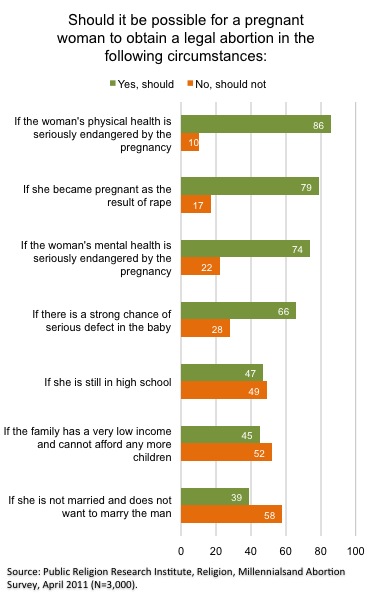As pro-choice advocates prepare to honor the 40th anniversary of Roe v. Wade, the Supreme Court decision has been getting decidedly ambivalent coverage in the press. In today’s paper, New York Times columnist Gail Collins puzzles over Americans’ discomfort with the issue of abortion, emphasizing their contradictory responses to questions about abortion on public opinion surveys:
Gallup polls suggest support for abortion rights is fading, particularly among young Americans, and that more people now regard themselves as “pro-life” than “pro-choice.” On the other hand…the polls depend on the question. According to the Quinnipiac poll, if you ask Americans whether they agree with the Roe decision, nearly two-thirds say yes.
This apparent incongruity is thrown into even starker relief in a 2011 PRRI survey, which allowed respondents to identify as both “pro-life” and “pro-choice.” The results showed that these labels don’t encompass the complexity of Americans’ attitudes toward abortion: 7-in-10 Americans said that “pro-choice” describes them somewhat or very well, while nearly two-thirds said the same of the “pro-life” label. Fully 43% of respondents identified as both “pro-choice” and “pro-life.”
 How to explain this contradiction? In the survey, a majority of respondents reported that abortion should be legal, but a similar number also agreed that it was immoral. Nearly 6-in-10 (58%) also agreed that at least some health care professionals in their community should provide legal abortions. And Americans’ perspectives on when abortion should be permissible vary widely: strong majorities agree that a woman should be able to obtain a legal abortion if the women’s physical health (86%) or mental health (74%) is seriously endangered by the pregnancy, if she became pregnant as the result of rape (79%), or if there is a strong chance of defect in the baby (66%). They are decidedly more divided on other circumstances, as the accompanying chart shows.
How to explain this contradiction? In the survey, a majority of respondents reported that abortion should be legal, but a similar number also agreed that it was immoral. Nearly 6-in-10 (58%) also agreed that at least some health care professionals in their community should provide legal abortions. And Americans’ perspectives on when abortion should be permissible vary widely: strong majorities agree that a woman should be able to obtain a legal abortion if the women’s physical health (86%) or mental health (74%) is seriously endangered by the pregnancy, if she became pregnant as the result of rape (79%), or if there is a strong chance of defect in the baby (66%). They are decidedly more divided on other circumstances, as the accompanying chart shows.
Support for legal abortion hasn’t wavered much over the past four decades, but it also hasn’t increased. Compare this to the dramatic shift in public opinion on same-sex marriage over the past ten years, and recent claims that “pro-choice” advocates are losing the war over abortion start to make sense. On the other hand, as Collins, who is herself pro-choice, points out, Americans continue to reject extreme positions on abortion at the ballot box. The doomed Senate campaigns of Todd Akin and Richard Mourdock serve as blunt reminders for public officials who take such stands.
Analyzing Americans’ perspectives on abortion inevitably lead to contradictions, and we’re frequently distracted by allegiance to the “pro-choice” and “pro-life” labels. If the polling data shows us anything, it’s that Americans’ complex attitudes toward abortion can’t be answered in one question. Maybe it’s time to stop trying.




